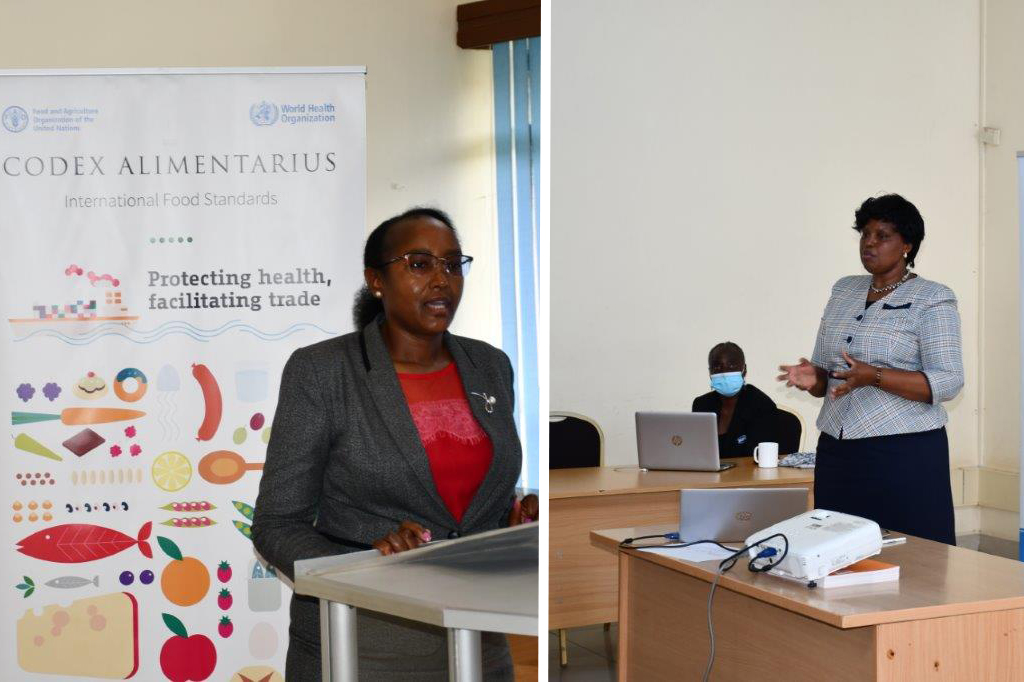Kenya / Increasing engagement in Codex by building up National Committee
Kenya, in an effort to streamline and increase efficiency for participation in Codex work recently reconstituted its National Codex Committee. On Tuesday 2 March 2021, the Codex Contact Point, housed in the Kenya Bureau of Standards held an induction programme for the newly reconstituted committee. “This move was to ensure maximum representation from all key food safety players,” said Maryann Kindiki who is the new Codex Contact Point for Kenya. Among the issues discussed were how the Codex Alimentarius Commission operates, details regarding the independent scientific bodies that provide specialist advice to Codex committees, the role of the National Codex Committee and that of the Codex Contact Point who coordinates all Codex activities within a member country. Participants were also briefed on the set up and operations of the FAO/WHO Coordinating Committee for Africa.

Esther Ngari, Kenya Bureau of Standards (left) and Grace Muchemi, Chairperson of the National Codex Committee
The Codex website is a central hub where users can access all the Codex standards, guidelines and codes of practice that often form the basis of national food safety legislation. The website also contains meeting documents and houses the systems that push out constant updates on work passing through the technical committees. Those attending the induction were shown how to successfully navigate the main areas of the site. “An optimal-performing team understands every member's role and responsibility,” said Kindiki. “We hope that the new team will be able to articulate Codex matters in the country as well as in the region, the ultimate goal being to ensure the safety and health of the citizens and ensure fair practices in food trade”.
Read more
At the heart of the Codex mandate are the core values of collaboration, inclusiveness, consensus building and transparency. Governmental and non-governmental, public and private organizations alike play a vital role in ensuring Codex texts are of the highest quality and based on sound science.
Codex would have little authority in the field of international standard setting if it did not welcome and acknowledge the valuable contributions made by observers. Expert technical bodies, industry and consumer associations
contribute to the standard-setting process in a spirit of openness, collaboration and transparency.
Intergovernmental organizations (IGOs) and international non-governmental organizations (NGOs) can apply for observer status in Codex in order to attend and put forward their views at every stage of the standard-setting process.
 Current Codex Alimentarius Commission
Current Codex Alimentarius Commission
Kenya / Increasing engagement in Codex by building up National Committee
Kenya, in an effort to streamline and increase efficiency for participation in Codex work recently reconstituted its National Codex Committee. On Tuesday 2 March 2021, the Codex Contact Point, housed in the Kenya Bureau of Standards held an induction programme for the newly reconstituted committee. “This move was to ensure maximum representation from all key food safety players,” said Maryann Kindiki who is the new Codex Contact Point for Kenya. Among the issues discussed were how the Codex Alimentarius Commission operates, details regarding the independent scientific bodies that provide specialist advice to Codex committees, the role of the National Codex Committee and that of the Codex Contact Point who coordinates all Codex activities within a member country. Participants were also briefed on the set up and operations of the FAO/WHO Coordinating Committee for Africa.

Esther Ngari, Kenya Bureau of Standards (left) and Grace Muchemi, Chairperson of the National Codex Committee
The Codex website is a central hub where users can access all the Codex standards, guidelines and codes of practice that often form the basis of national food safety legislation. The website also contains meeting documents and houses the systems that push out constant updates on work passing through the technical committees. Those attending the induction were shown how to successfully navigate the main areas of the site. “An optimal-performing team understands every member's role and responsibility,” said Kindiki. “We hope that the new team will be able to articulate Codex matters in the country as well as in the region, the ultimate goal being to ensure the safety and health of the citizens and ensure fair practices in food trade”.
Read more
 Codex and Observer
Codex and Observer
around the world since ancient times.
We might not always know where it comes from,
but we expect it to be available, safe and of good quality.









Leave a comment